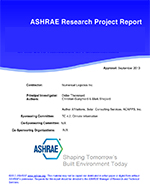Numerical tools for two-dimensional or three-dimensional heat transfer are readily available to the building professional to calculate the thermal transmittance of thermal bridges. However, designers need appropriate limits to compare the predicted performance and decide whether it is necessary to improve the detailing. This paper presents a methodology to develop such limiting values. First, the influence of thermal bridge geometry and insulation thickness on the linear transmittance is analyzed. Then the two-dimensional transmission heat loss resulting from all joints encountered in five typical masonry dwelling designs is quantified. The distribution of the heat loss over different components (junctions with roof, window, foundation, etc.) is presented. Finally, limits for the linear thermal transmittance are developed in order to minimize two-dimensional transmission heat loss. The limiting values differ as a function of thermal bridge geometry and take into account the technical feasibility of the requirements.
Presented at Thermal Performance of Exterior Envelopes of Whole Buildings X – December 2007
Units: SI
Citation: Thermal Performance of Exterior Envelopes of Whole Buildings X
Product Details
- Published:
- 2008
- Number of Pages:
- 10
- File Size:
- 1 file , 2.1 MB
- Product Code(s):
- D-BldgsX182


